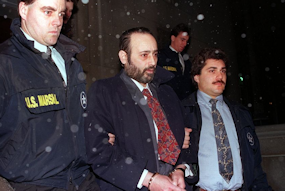From Cartels Using Retail Stores in LA's Fashion District to Launder Millions
To:
Brooklyn Gangsters Running the Crazy Eddie Retail Empire


The Crazy Eddie electronics
chain, at its peak, numbered a respectable
43 stores from Philadelphia to
Boston, but in the
mid-1980s the discount retailer enjoyed an astonishing 99% name recognition
among New Yorkers, higher even than the sitting president, Ronald Reagan. Anyone
who resided in the region at the time knows why: the ubiquitous and incessant
Crazy Eddie commercials, which featured a DJ named Jerry Carroll gesturing
wildly and screaming, “His prices are insane!”
&uuid=(email))
The Crazy Eddie empire was,
from the start, built on lies and deception, with the fraud
becoming so brazen that the company finally collapsed on itself.
The villain at the
center of the drama is Eddie Antar, born in 1947, whose grandparents came to the
United States from Syria and settled in south Brooklyn. Many of the Antars were
in cash-based businesses, stashing their earnings in ceilings and mattresses to
avoid paying taxes.
How they kept prices low included buying inventory below cost
from an illegal supplier,
selling merchandise at or below cost but
pocketing the sales tax,
pricing stereo components cheaply while
overcharging for
accessories, and
passing off floor models and
returned equipment as new product.
With a cousin as the accountant they took the company public in 1984.
The Antars had unwittingly backed themselves into a corner; as Mr. Weiss
explains, “more and more fraud was required just to keep afloat.” Fearing what
was to come, Eddie began dumping stock and moving money out of the country. The
denouement is unsurprising: shareholder class-action lawsuits, an SEC
investigation, a criminal probe. The Antars, shredding every document in sight
and lying under oath, began to turn on one another. Newspaper ads toward the end
cheerfully promoted “Crazy Eddie’s Family Feud Blowout Blitz,” but the ship was
sinking fast. Eddie, who’d been taught from childhood that family came first,
left everyone behind and, fake passport in hand, fled to Israel, where he’d
socked away millions.
Once extradited to the U.S.,
Eddie pleaded guilty to
racketeering and served close to seven years in federal prison. (He died in
2016.) Sammy the
accountant, cooperated with prosecutors and avoided prison time. He is Mr.
Weiss’s primary source, and his colorful recollection of events fuels the
fast-paced, entertaining narrative. “The due-diligence guys . . . come over, and
they’re
seeing a bunch of Brooklyn
thugs running a business,”
begins a typical anecdote.
wsj.com
Full article published by
The Wall Street Journal

&uuid=(email))


&uuid=(email))
&uuid=(email))
